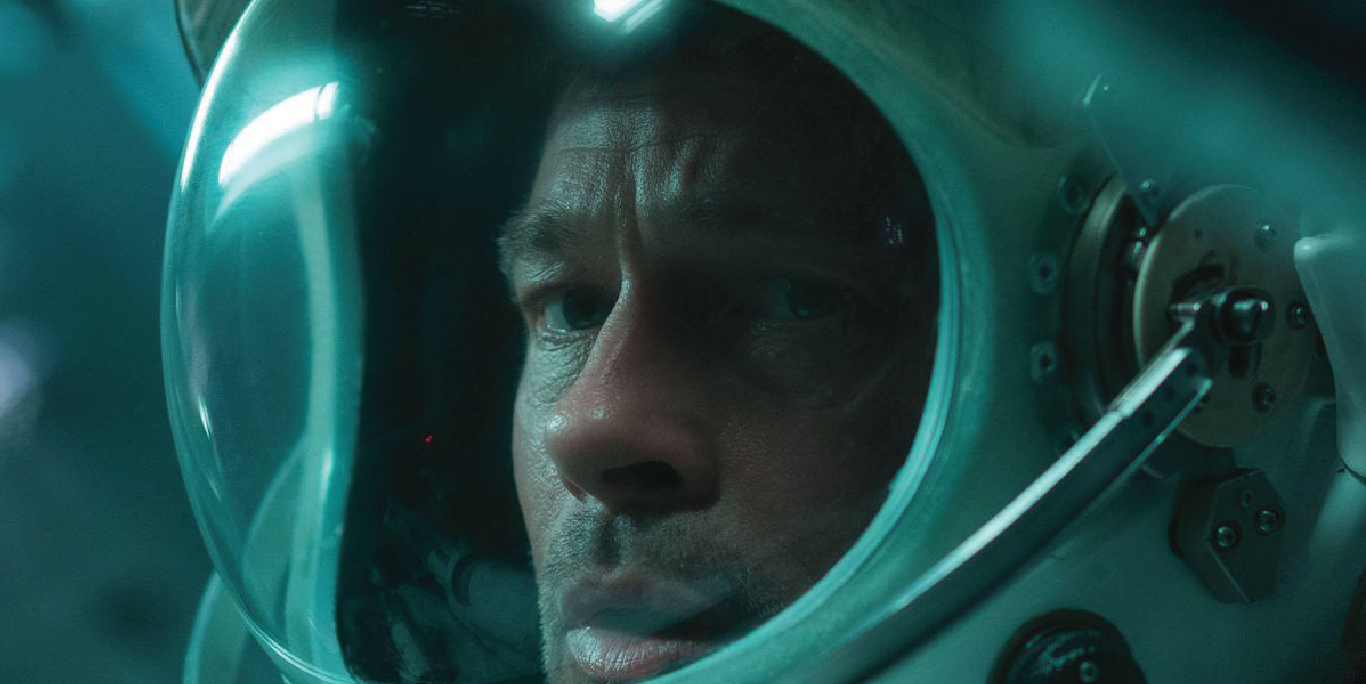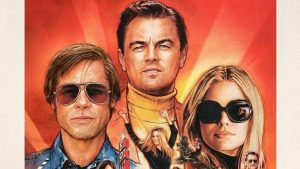Bathed in the orange planetary glow of a Martian recording booth, astronaut Roy McBride (Brad Pitt) goes off-script.
Roy, far from home on the Red Planet colony, is being used by superiors from Earth’s military space command to lure his father, Dr. Clifford McBride (Tommy Lee Jones), out of hiding. Sixteen years prior, on a far-flung mission in search of signs of intelligent life, Clifford and his crew went silent on the fringes of Neptune. As electrical storms and power surges of nebulous origin threaten mankind, the man space command once thought dead is now suspected to have gone rogue.
Roy’s quiet message cuts to the bone: “Dad, I’d like to see you again.” The foreignness of the setting collides with the raw humanity of Roy’s inner conflict, seeping out of the cracks in the spaceman’s oft-composed exterior. Ad Astra (2019) wars with itself, striking a tense balance between estrangement and vulnerability, between larger-than-life visuals and the weighty stillness of its star’s emotional journey.
Following in the spacesuited footsteps of his father, Roy has become an interstellar legend in his own right: steady, dependable, and level-headed. Even as he plummets earthbound from the International Space Antenna with a gaping tear in his parachute, his heart rate never exceeds 80 BPM. Aside from psych evaluations in which a robotic voice parrots, “Please describe your current emotional state,” and assigns his response a passing or failing assessment, Roy evades probing questions about what he thinks of his mission to find his father, donning instead a persona of detached stoicism. His monotone narration about the horrors he faces mirrors the artificial intelligence that evaluates him. Grief and loneliness have no place in the life of an explorer; Roy’s relatively emotional message to his father is not only a sign of weakness but an act of rebellion against this stoic ideal.
With Ad Astra, Brad Pitt seeks to dissect the heroism of the masculine “Marlboro Man” archetype of his Missouri childhood, and director James Gray concurs: “The whole idea of being ice cold under pressure is such bullshit.” For Gray, the project was a personal exploration of fatherhood and the fear of reproducing the missteps of our parents. Roy, by virtue of his dogmatic faith in the mythos that space command has created around Clifford, unquestioningly adopts the same emotional unavailability of his father. But, as the mystery of his father unravels and events cast doubt on Clifford’s character, Roy finds an ever-dwindling stability in everything he holds true.
In this far-off time “of hope and conflict,” so-described in opening credits akin to a Star Wars text crawl, planets’ surfaces feel at once familiar and alien, as if out of some prophetic déjà vu. It’s neither utopic nor dystopic; rather, problems of the future look a lot like the problems of the past expanded through the stars. Roy flies commercial—Virgin Atlantic, to be specific—to a moon with an Applebee’s, thoroughly colonized and capitalized. In the endeavor to escape its own voracious consumption, humanity ends up dragging its baggage along with us on our journey ad astra.
Even when touched down on terra firma, there’s a feeling of floating, of unanchored alienation from the film world’s idiosyncrasies. Tight corridors through the celestial outposts and secluded “comfort rooms” (the time-out zone for those who fail psych evaluations) dislocate the audience. Ad Astra utilizes its remote setting to take liberties with reality: a high-octane, yet remarkably restrained, Mad-Maxian lunar rover chase sequence skirts the edge of the dark side of the moon. Roy battles space pirates and space primates which, as silly as it sounds, inspire more dread than humor. Natasha Lyonne plays herself as a Martian immigration agent, New York accent and all. Somehow, amidst the outlandish science fiction tropes and brief comedic respites, the film walks the thin tightrope between overly serious and utterly ridiculous.
The humanity of the story is primarily to credit for this balancing act. In between the gorgeous barren landscapes and panoramic blackness shot by cinematographer Hoyte van Hoytema, James Gray makes all the small moments count. Close-ups of Roy’s face through the clear plastic of his spacesuit’s helmet ground the audience in Pitt’s subtle performance: a man in opposition to the sublimity of space. And, of course, his father, and all the tiny details Roy remembers of their life before, is the thread that weaves everything together.From black and white musicals to math tutoring, Roy is shaped by his father’s presence as much as his absence.
Back in the recording booth, Roy wrestles with how to untangle his love for his father from the resentment of being an astronaut’s son. Beamed across the vastness of the dark universe, his words yearn for a man cosmically out of his reach.
Many first reactions to Ad Astra have been reviews by comparison: First Reformed (2017) meets 2001: A Space Odyssey (1968) meets Arrival (2016) meets Solaris (1971). Ad Astra also begs comparison to Gray’s previous work, The Lost City of Z (2016), alike in its melancholy dive into the psyche of a recalcitrant explorer and his son.
In The Lost City of Z, Victorian-era colonial ventures into the heart of the Amazon take the place of extraterrestrial expeditions, but the same muted contemplation of Ad Astra clings to every yellow-tone scene. Percy Fawcett (a surveyor-turned-explorer played by Charlie Hunnam) is on a quixotic search for the mythic city of “Z” with his son in tow. Captured by natives and in dire peril, Percy half-hallucinates, half-remembers his wife reading a letter she wrote to him while pregnant, fearing that she might not survive the childbirth of their soon-to-be son. “Always teach him to dream, to seek the unknown,” the letter implores. “A man’s reach should exceed his grasp, or what’s a heaven for.”
What does it mean that we’ll fly to the ends of the galaxy to get even the slightest bit closer to the unknown? What does it mean that we’ll follow each other there? Clifford, faced with the reality of his failure to find intelligent life in the distant cosmos and the failure to be present for his son, comes to a harrowing revelation that seems to defy the pioneering fever of The Lost City of Z’s hero: “We’re all we’ve got.”
On Earth, a gloved hand reaches down into a crash-landed spacecraft, extended in offering to the astronaut. Roy, in spite of his father, or perhaps because of him, takes it. Thus, the journey through the solar system ends where it begins, on the solid ground of a familiar planet.





